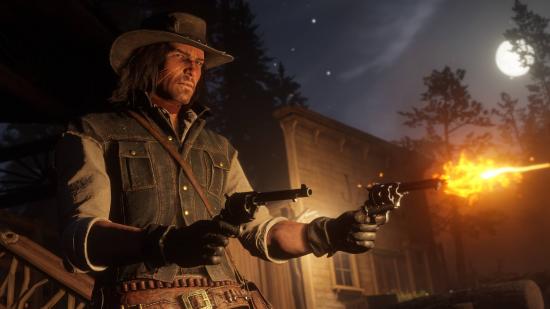October 18, 2018 Rockstar has released some specific numbers in the wake of its crunch controversy.
A number of developers at GTA and Red Dead Redemption studio Rockstar have discussed their working conditions on social media, after their famously tight-lipped employer apparently lifted a ban on their doing so. Studio reps have provided specific numbers, too – and those stats suggest that the average work week this year is under 46 hours.
Rockstar’s stats are based on self-reported hours from employees. From January 8 to the end of September, work hours averaged between 42.4 and 45.8. There are some outlying big crunch weeks in all that – the week of July 9 saw employees average 50.1 hours, as 20% of the studio’s employees worked over 60 hours during that period. The longest hours for any individual employee there comes out to 67.1.
Those stats were provided to The Guardian, who also spoke with co-studio head Rob Nelson about the controversy over Rockstar’s working conditions. “It’s something that we’re always striving to get better at. We’re growing as fast as we can, and we’re structuring our departments based on need, because we don’t want people working too hard.”
Nelson acknowledges that overtime happens, but “Is it something we want happening regularly for long periods of time or as an accepted part of our process or as a ‘badge of honour’ thing? No, it is not.”
Generally, the tweets we’ve seen from employees agree that crunch hours at Rockstar are roughly 45 to 50 per week, and that they don’t feel this is excessive.
In case you missed it, that controversy was sparked after Rockstar co-founder Dan Houser told Vulture “we were working 100-hour weeks” to finish Red Dead Redemption 2. After an immediate backlash, Houser walked this back in a statement to Kotaku, saying he was only talking about the writing team, only over a three-week period, and that “no one, senior or junior, is ever forced to work hard.”
For the most part, Houser’s employees seem to agree. Tools programmer Vivianne Langdon says “I have never worked more than maybe 50 hours a week (and that’s a rare occurrence), but I generally work about 2-6 hours of paid overtime per week.” Where she works overtime, “it is not the result of anyone forcing me to stay late or giving me impossible deadlines, but rather my own drive as a programmer.”
Vehicle artist Danny Bannister takes a similarly relaxed view: “there was some crunch sure but nothing ridiculous […] I think the most I did on RDR2 was 60 for one week. I know for a fact that my lead would’ve sent me home if I even attempted 100 hours a week. That’s just not how it’s done here.”
Music developer Keith Thorburn is the most effusive of all, adding that “staying later meant an extra 2-3 hours a night during the week or two before a deadline. I was never asked to do it or made to feel any pressure to do it, and the company fed me on these nights.” He also insists that his whole team agrees they’d “found a very healthy work/life balance on RDR2”.
First off, this was one of the most rewarding and least stressful projects I've worked on. I know what epic crunch feels like but this was managed in such a way that I felt happy and healthy. I can only speak of my own experience but I know in recent chats with
— Keith Thorburn (@keiththorburn81) October 18, 2018
To round up a few of the others: a Rockstar tester with a decade of service says she’s “never once” worked “anywhere near” 100 hours. Six-year veteran Wesley Mackinder says 50 hours was the limit of his crunch, and that it’s been “surreal” to see other devs share their horror stories in response to Rockstar’s culture.
It's been surreal to see people share their crunch stories with the conclusion being, 'Rockstar needs to change'. When I've just been reading them thinking, 'I'm so glad I work at Rockstar and haven't done anything they have'.
— Wesley Mackinder (@WesleyMackinder) October 18, 2018
Tom Fautley takes a dimmer view, but doesn’t actually demur from this tenative consensus of what constitutes crunch at Rockstar: his estimate of “typical” crunch time is “around 45-50 hours,” though he does say some colleagues have definitely worked a lot more, and that “as someone with health issues linked to stress and anxiety, it’s not always great.”
Rockstar has been criticised over crunch before, most infamously around the release of the original Red Dead Redemption, when a group of developers’ spouses published a blog on Gamasutra complaining about the treatment of their other halves. That was over eight years ago, however, and it’s possible that that incident sparked a change in culture.
A little scepticism is warranted, nonetheless. Ungagging your devs to speak freely on Twitter is well and good provided they say nice things, but criticising one’s current employer in public is not the easiest thing to do. And on that note, Kotaku’s Jason Schreier has said he’s been speaking to “dozens” of current and former Rockstar employees for a larger story on this, so anyone wishing to criticise the company will probably feel more comfortable talking anonymously to him.
With Rockstar under fire, its most loyal employees may also feel extra motivation to defend them. That’s not to say their experiences should be ignored, but the pool is a self-selecting one to some extent.
